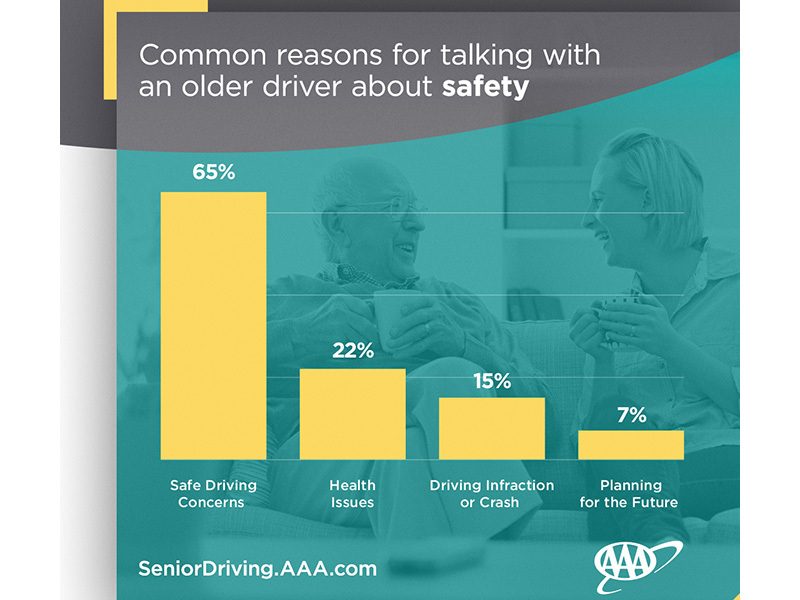Having a conversation about safe driving concerns with a senior citizen can be challenging, but it’s an important talk to have. Unfortunately, not enough older Americans are having these discussions.
Nearly 83 percent of older drivers report never speaking about their safe driving ability to a family member or doctor, according to new research from the AAA Foundation for Traffic Safety. Of the small percentage of families who do have a conversation, 15 percent do so after a crash or traffic infraction has occurred – which could be too late.
Due to their fragility, older drivers are at greater risk of death and injury if involved in a crash. In 2016, more than 3,500 drivers age 65 and older died in traffic crashes and more than 200,000 were injured.
With seniors currently outliving their ability to drive safely by an average of seven to 10 years, AAA urges families to avoid waiting to talk with older drivers about safety and help seniors plan for “driving retirement” just as they plan for financial retirement.
“The right time to stop driving varies for everyone,” said Dr. David Yang, executive director of the AAA Foundation of Traffic Safety. “This research shows that older drivers can be hesitant to initiate conversations about their driving capabilities, so it is important that families encourage them to talk early and often about their future behind the wheel. With early discussion and proper planning, elderly drivers may extend their time on the road.”
AAA recommends that families start talking with older adults about safe driving early and avoid waiting until there are “red flags” such as crashes, scrapes on the car, new medical diagnoses or worsening health conditions. Families should:
• Start talking early and often. Be positive and supportive in your conversations, as well as focus on ways to help keep older drivers in your family safe behind the wheel.
• Avoid generalizations. Do not jump to conclusions about an older driver’s skills or abilities.
• Speak one-on-one. Keep the discussion between you and the older driver. Inviting the whole family to the conversation can create feelings of alienation or anger.
• Focus on the facts. Stick to information you know, such as a medical condition or medication regimen that might make driving unsafe. Do not accuse an older driver of being unsafe or assume that driving should be stopped altogether.
It is important that families have a plan to help keep the older driver on the road for as long as safely possible. Previous AAA Foundation research found that older adults who have stopped driving are almost twice as likely to suffer from depression and nearly five times as likely to enter a long-term care facility as those who remain behind the wheel. That is why it is important to have the conversation early and explore all available options, including other forms of transportation.
Families can use the AAA Driver Planning Agreement as a guide to starting conversations about safety. The agreement allows families to plan together for future changes in driving abilities before they become a concern.
To download the AAA Driver Planning Agreement, or for more information on AAA resources for older drivers, visit www.SeniorDriving.AAA.com.






